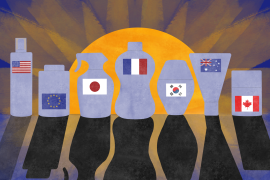Number of HIV Cases in Asia Could Increase by 8M Unless Increased Action Is Taken To Address Virus, Report Says
The number of HIV cases in Asia could increase by more than 150%, or eight million cases, by 2020 unless more is done to prevent the spread of the virus, according to a report released Wednesday by the United Nations Commission on AIDS in Asia and the Pacific, Reuters reports. According to the report, about five million people are living with HIV/AIDS in Asia, and 440,000 people in the region are dying annually of AIDS-related causes. The report also found that the number of annual AIDS-related deaths could increase to 500,000 by 2020 without a bolstered response to the disease (Krauskopf, Reuters, 3/26).
The 238-page report was based in part on online responses from hundreds of representatives from community groups that are involved in HIV/AIDS-related work in Asia. The report found that Southeast Asia has the highest HIV prevalence in the region and that Indonesia has the fastest rate of growth (AFP/Google.com, 3/26). In addition, the report found that AIDS-related illnesses are the most likely cause of death and lost work days among people ages 15 to 44 (Reuters, 3/26). According to the report, the epidemic in Asia is characterized by high-risk behavior among commercial sex workers and their customers, injection drug users and men who have sex with men (Kyodo News, 3/26). The report noted that by 2020, the increase in the number of cases could be kept at three million if a response is adopted immediately. The commission recommended a minimum annual investment of 30 cents to 50 cents per capita on focused prevention programs (Reuters, 3/26). It added that an annual budget of $1 billion for prevention programs among high-risk populations could reduce new cases by 60%. According to the report, about $1.2 billion was available for overall HIV/AIDS programs in Asia in 2007, while the amount needed for an adequate response to the disease was about $6.4 billion (AFP/Google.com, 3/26).
Chakravarthi Rangarajan, chair of the commission, said that heads of governments should become directly involved in HIV prevention efforts to show leadership on the issue, which generally has been lacking. He added that prevention programs should promote the extensive use of condoms. The commission added that efforts to develop policies to fight the spread of HIV should involve the communities most affected by the disease and that governments need to change or abolish laws that incite HIV-related discrimination (Reuters, 3/26). The programs also should focus on protecting the wives of men who frequent commercial sex workers, as well as on providing sex education in schools and colleges, the report said (AFP/Google.com, 3/26).
Comments
UNAIDS Executive Director Peter Piot said the report "shows clearly that the response to the epidemic has to be tailored to Asian realities. ... There is not one Asian reality, there are many. The time is gone that with a blueprint for the whole world, we can stop this epidemic" (Reuters, 3/26). Rangarajan said, "The costs of inaction are simply too high," adding, "Without concerted and evidence-based responses, Asia can expect an economic (annual) loss of $2 billion" by 2020 (AFP/Google.com, 3/26).
U.N. Secretary General Ban Ki-moon in a statement said, "By implementing the recommendations of the commission, Asian countries can avert massive increases in infections and death, prevent economic losses and save millions of people from poverty." He added, "Such leadership is critical in Asia today" (Kyodo News, 3/26). Ban said, "We will never see equitable progress if some parts of the population are still denied basic health and human rights" (AFP/Google.com, 3/26).






